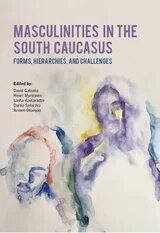Masculinities in the South Caucasus
Masculinities, as this rich volume shows, are varied, multiple, layered, dynamic, and often contradictory. Yet, in Armenia, Azerbaijan, and Georgia, as elsewhere on the planet, we often intuitively tend to think of masculinity in the singular, as static, and unchanging, and as something we may refer to with: “We know it when we see it.” As with gender role expectations more broadly, we are often socialised into thinking of masculinities as innate, natural, and biologically pre-determined, at times as God-given for some, and easily knowable. We tend to assume that we already intuitively know what it means “to be a man” in our respective societies, what it means to be “manly” or not, and often use these as yardsticks to – consciously or subconsciously – judge others and ourselves, regardless of what gender we identify as. The authors of this volume do us a valuable favour by disturbing these ingrained assumptions; they do so in a way that is (self-)reflective, critical, nuanced, multi-faceted, and beautiful.
Concepts of South Caucasian masculinities have long played a central role in insider and outsider perceptions of societies in this region. They have been embedded in legends, folk tales, artworks, male-centric history books, but also in anecdotes, jokes, as well as pejorative and racist stereotypes. Common elements include stoic toughness, bravery, valour, heterosexual virility, social skills, a capacity for violence, adherence to “codes of honour” and – unless forbidden by religion – drinking and being able to hold one’s liquor. As is often the case with gender role expectations, South Caucasian masculinities are often conceived of as ahistorical and static, a Thing that has been and is a constant benchmark for men to be measured against.
As the contributions to this book show, the lived realities of men are much more complex and dynamic, yet also shaped by those often-unrealistic expectations of “real” manhood. The lived realities of men covered in this book include emotional vulnerability, the juggling of competing expectations, economic hardship, political impotence in the face of unequal power relations, exposure to violence, trauma, failure, but also love, care, friendship, and crafting one’s own way of being a man that may or may not align with societal expectations. As the chapters also show, masculinities are the products of historical processes. Masculinities in Armenia, Azerbaijan, and Georgia have been and are shaped by local cultures, Islam and Christianity, neighbouring powers, the experience of Russian and Soviet rule, the wars that affected all three countries, and the influences of modernisation, neo-liberalisation, urbanisation, and globalisation. As several chapters underscore, these historical shifts have also forced men to adapt multiple times to shifting circumstances and in part, radically changed frames of reference. Thus, South Caucasian masculinities of today are a complex mix, in which the traces of these historical influences and men’s responses to them are visible to differing degrees.
Product details
Table of contents
Publisher’s Foreword 9
Editors’ Foreword 11
Forming and Embodying Masculinities 20
Don’t Touch! / Ձեռք մի՛ տուր
Gevorg Ter-Gabrielyan / Գևորգ Տեր-Գաբրիելյան 22
Masculine Clothing and Clothing Masculinity:
What Are Young Georgian Men Wearing in Tbilisi and Why
მასკულინობის შემოსვა და შემოსილი მასკულინობა:
რას და რატომ იცვამენ ახალგაზრდა ქართველი მამაკაცები თბილისში
Mariam Kakhniashvili, Giorgi Kikoria / მარიამ კახნიაშვილი, გიორგი კიკორია 78
The Martial Arts Boys / საბრძოლო ხელოვნების ბიჭები
Shorena Tevzadze / შორენა თევზაძე 124
The (Ir)reproachable Armenian Guy / (Ան)թերի հայ տղան
Armine Danielyan / Արմինե Դանիելյան 140
“Dadfluencing” in Georgia: The Self-Representation of Fatherhood
as Caring Masculinity on Social Media
„ინფლუენსერი“ მამები საქართველოში: მამობის, როგორც მზრუნველი მასკულინობის თვითრეპრეზენტაცია სოციალურ მედიაში
Tekla Nemanishvili / თეკლა ნემანიშვილი 166
Power, War, and Masculinities 182
The Chairs of Hegemony / ჰეგემონიის სკამები Nino Gavasheli / ნინო გავაშელი 184
#WeWillWin When We Become Good Citizens,
or Hegemonic Masculinity in Armenian State War Rhetoric
#Հաղթելու ենք, երբ դառնանք օրինակելի քաղաքացիներ
կամ Հայաստանի ռազմական հռետորաբանության մեջ գերիշխող մասկուլինությունը
Elitza Kotzeva / Էլիցա Կոցևա 198
Politics of Masculinity Crisis and Gender Order in Post-2020 War Azerbaijan
İkinci Qarabağ Müharibəsindən sonra maskulinlik böhranı
və gender nizamının siyasi cəhətləri
Sevinj Samadzade / Sevinc Səmədzadə 240
Military, LGBTQI+, and State Violence in Azerbaijan
Azərbaycanda hərbi xidmət, LGBTQİ+ və dövlət zorakılığı
Ramil Zamanov / Ramil Zamanov 264
Exploring Clerical Masculinity in Georgia: An Analysis of Three Cases
სასულიერო მასკულინობა საქართველოში: სამი შემთხვევის ანალიზი
Ketevan Lapachi / ქეთევან ლაფაჩი 312
War, Masculinity, and Death in the Early Cinema of Sergei Parajanov
ომი, მასკულინობა და სიკვდილი სერგეი ფარაჯანოვის
ადრეული პერიოდის ფილმებში
Simon Garibyan / სიმონ გარიბიანი 334
Masculinities on the Margins 370
The Relationship between Criminal Practices, Criminal Subculture,
and the Notion of Masculinity
Քրեական բարքերի, ենթամշակույթի և «տղամարդկություն»
եզրույթի առնչությունը
Armen Grigoryan / Արմեն Գրիգորյան 372
Place Your Bets
Mariam Natroshvili / მარიამ ნატროშვილი 392
“The Forest Is My Space for Freedom” :
Masculinity and a Private Hunting Ranch in the Forests of Racha
„ტყე ჩემი თავისუფალი სივრცეა“:
მასკულინობები და კერძო სამონადირეო მეურნეობა რაჭის ტყეებში
Salome Kobalava / სალომე კობალავა 418
Masculinities and the Gendered Other 456
Navigating Gender Expectations as a Queer Individual in Azerbaijan
Azərbaycanda gender gözləntiləri qarşısında kuir kimliklər
Arel / Arel 458
“Feminism or Frivolity?”: Hegemonic Masculinities, Honour Culture,
and the Feminist Movement in Azerbaijan
“Feminizm, yoxsa özbaşınalıq?”: Azərbaycanda hegemon maskulinlik,
namus-qeyrət və feminizm hərəkatı
Lala Darchinova / Lalə Darçınova 470
